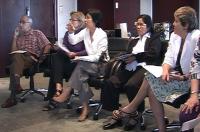 Over five days in May, the TC reform was presented, discussed, and brought "down to earth" in Manila in the Philippines. The EC Delegation had organised this first flexible learning and coaching process in close dialogue with the Brussels-based reform task team.
Over five days in May, the TC reform was presented, discussed, and brought "down to earth" in Manila in the Philippines. The EC Delegation had organised this first flexible learning and coaching process in close dialogue with the Brussels-based reform task team.
Can five days be meaningfully spent discussing technical cooperation reform? The experience from a week-long process in Manila, running from 11 - 15 May, suggest that the answer is "yes".
Country support to technical cooperation reform is meant to strengthen country processes and stakeholders going beyond a traditional "training" approach. Of course there was some "training" as well. Over two days, delegation staff, EC contracted technical assistants and a government partner went through the Guidelines for Making Technical Assistance Effective.
Following the formal training events there were tailored coaching events discussing the Action Fiches, the Terms of Reference and the programme implementation arrangement around the EC's support to trade and health, respectively. The two coaching processes played out very differently. In trade, there was a one-to-one coaching over a couple of hours. In health, it turned out to be a somewhat large group for coaching, involving around 20 participants from government, civil society, the EC and other development partners.
In between the coaching sessions the TC reform and the key messages of the Guidelines were presented in a half-day session to an audience of more than 50 drawn from various sectors of government, civil society and a broad range of development partners. Closing the week, we had a discussion of the future actions at country level to continue the TC reform work.
Close Dialogue in the Preparation of Events
 This event in Manila was the first of its kind and was prepared in close dialogue with the delegation. Philippines was the first place to show an interest in working more closely with technical assistance issues, with a particular emphasis on the health sector where a new phase of support was under preparation (read more here).
This event in Manila was the first of its kind and was prepared in close dialogue with the delegation. Philippines was the first place to show an interest in working more closely with technical assistance issues, with a particular emphasis on the health sector where a new phase of support was under preparation (read more here).
The week had no pre-defined format, other than an ambition to produce relevant and effective learning about TC reform, not only for delegation staff but also for country and development partners. On the agenda was a mixture of training, in-depth coaching and short presentations (including presentations by delegation staff), all drawn up in close consultation with the delegation.
What Did We Learn?
Participants in the various events expressed generally high satisfaction and appreciated the flexible format. But the real value of this event was that it was a two-way process, with facilitators carrying insights into how TC reform works back to Brussels headquarters. Here, two messages stood out:
1 - The substance of TC reform is generally accepted.
Technical assistance must be demand driven, country owned, results-oriented and provided in partner-owned implementation arrangements. But from these generally desirable features there are many concrete and specific concerns that have to be considered on the ground, taking the context into account. And this is neither straightforward or without trade-offs. The devil is in the details!
2 - Standardised models risk smothering motivation.
TC reform risks missing the finer nuances of these details if it insists on standardised and formal summary reporting instruments that tend to alienate rather than motivate delegation staff.
Several other reciprocal learning events of this kind are expected to take place in the autumn. Click here to get more information and express interest.






Log in with your EU Login account to post or comment on the platform.